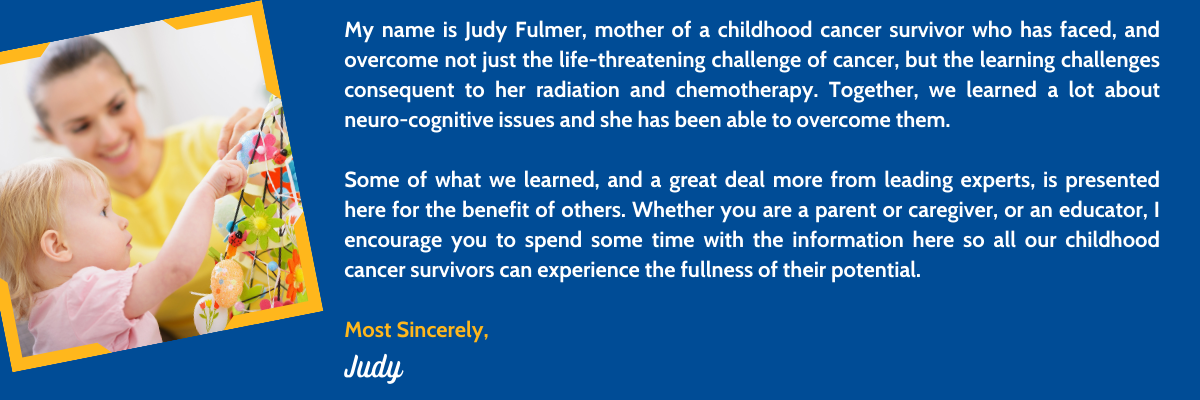Childhood Cancer Education Toolkit for Parents and Caregivers
As the parent or caregiver of a child battling cancer, you are facing a life-threatening challenge, and are rightly focused on getting the very best clinical care for your child. We are here for you, and want you to be prepared as well for other challenges that lie ahead.
Childhood Cancer Education Challenges
Most childhood cancer survivors will experience one or more chronic and lifelong health issues including some that affect learning abilities. Their return to the normalcy of school, friends and activities will be a joyous time, but also a time to be alert for changes in their ability to process information and learn.
- Slower processing speed – it takes your child a little longer to understand things
- Short term memory loss
- Inability to focus or concentrate for long periods of time
- Poor organization skills – remembering to do homework or bring it to school
- Difficulty multitasking – maybe not listening to you while tying their shoes
- Visual-spatial deficits – maybe bumping into things
- Difficulty remembering words
- Fatigue - needing breaks
Resources:
National Institute of Health
What helps when your child is faced with these challenges?
- A strong support system within your family and friends
- A good working partnership with your child’s medical team and your child’s school team, including teachers, the principal, and the school nurse or social worker
- Knowing what resources are available to assist your child, including perhaps…
- Setting up an education plan with the school – this could be an Individual Education Plan (IEP) or a 504 Plan to which you are entitled under Federal and State Law
- Making a transition plan for your child’s gradual return to school
- Asking that school staff and classmates be informed of your child’s return to school and asked to be supportive
- Networking with local and state agencies, non-profit organizations, and businesses in the community
The diagnosis of childhood cancer provokes many questions. The answers to these questions are difficult enough for adults, so what do you say when asked these tough questions by children? Is there a correct answer or do the answers vary depending on the individual?
Why me?
What did I do so wrong to deserve this?
Why do bad things happen to good people?
Who is watching over me?
Lessons Learned when working with Childhood Cancer Patients and Survivors
Kids have worries too.
Even though children and teens have been medically cleared to return to school there may be days in which that student may appear preoccupied or unable to focus. They may often worry about relapse, upcoming scans that are scheduled, or how the good friend at the hospital is doing with their treatment. When you see the child or youth is having a particularly bad day, find some quiet time to ask if everything is okay. They may share with you their fears, concerns, and worries. Sometimes these worries are too big to carry alone!
It’s Okay to Cry
Working with children and families who have experienced a devastating medical diagnosis, trauma, and even loss is not easy. It is really hard! What do you say when a child or teen, a sibling or other family member bares their soul about past or upcoming medical treatment or another family crisis? You talk with them and let them know you care. And yes, it is okay to cry with the child or family that is hurting. We are all human and emotions are part of being human.
The Need for Normalcy
Just as adults get up and go to work each day, children and teens get up and go to school. When they are no longer able to attend school daily due to medical reasons they feel a great loss. Therefore, once they transition back to school, they will need subtle accommodations so they do not feel so different from their peers. Such accommodations may include a peer buddy with whom to play board games when others are participating in recess or physical education activities that are too strenuous or demanding, or eating lunch with a peer buddy when crowded lunch rooms must be avoided. This is a time when school personnel must be creative and help the child or teen find normalcy at school despite the limitations they might be experiencing.
Belonging
Many changes come with a medical diagnosis. Teens who were once star athletes are sometimes told they can no longer play football, basketball, soccer, or other contact sports. Others who have spent hours practicing or rehearsing for a role in the dance recital or upcoming performance no longer have the energy to perform. When children return to school, they often feel that they no longer have a social group in which to belong. They feel a loss and the loss is great.
You may want to encourage the child or teen to try other activities such as art, band, chorus, theater, robotics team, or chess club. Schools today offer so many extra-curricular activities that there are many options. If the student does not seem interested in the school activities, community involvement such as church youth group, scouts, or volunteering at a shelter or for a non-profit organization may be an option. The key is finding a social group in which to feel a part and belong!
Message from A Mother

